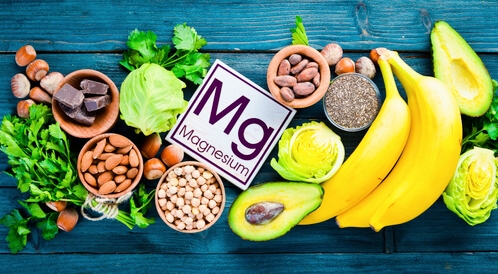Understanding Magnesium Deficiency: Symptoms and Dietary Solutions

Magnesium is vital for more than 300 enzymatic processes in the body, aiding in muscle function, nerve signaling, blood sugar regulation, and bone health.
When magnesium intake declines due to factors like stress, inadequate nutrition, or certain medications, the body may exhibit subtle yet significant warning signs, as noted by Times of India.
* 9 Symptoms of Magnesium Deficiency:
1 _ Muscle Cramps and Twitches:
Commonly occurring in the legs or eyelids, these symptoms arise because magnesium is essential for muscle contraction regulation; its deficiency leads to involuntary contractions.
2 _ Unexplained Fatigue:
A lack of magnesium impairs cellular energy production, resulting in feelings of tiredness even after sufficient rest.
3 _ Sleep Disturbances or Insomnia:
Magnesium influences melatonin and GABA, both of which help regulate sleep. A deficiency can cause trouble falling asleep, staying asleep, or experiencing vivid dreams.
4 _ Increased Anxiety or Irritability:
Low magnesium levels can heighten the brain's sensitivity to stress, resulting in anxiety, mood fluctuations, or irritability, often mistaken for emotional fatigue.
5 _ Irregular Heartbeat:
Magnesium is crucial for maintaining heart electrical signals; its deficiency can lead to palpitations or rapid heartbeats, particularly in individuals with pre-existing heart conditions.
6 _ Weak Nails and Brittle Bones:
Magnesium aids in calcium absorption; its deficiency can lead to weakened bones and nails, with noticeable changes developing over time.
7 _ Headaches and Migraines:
A deficiency in magnesium can disrupt neurotransmitter functions and blood vessel contractions in the brain, leading to frequent and sometimes severe headaches.
8 _ Tingling or Numbness in Extremities:
As nerves depend on magnesium, its deficiency can result in tingling or numb sensations in the hands and feet due to impaired nerve signaling.
9 _ Cravings for Sugary Foods:
Low magnesium levels can weaken insulin function, causing sudden cravings for sweets and fluctuations in blood sugar, which may increase the risk of prediabetes or insulin resistance over time.
* 5 Foods to Combat Magnesium Deficiency:
1 _ Pumpkin Seeds:
A small serving can fulfill about half of the daily magnesium requirement and is also rich in healthy fats and antioxidants.
2 _ Leafy Greens:
Vegetables like spinach, kale, and Swiss chard can be easily incorporated into smoothies, soups, or cooked meals to enhance magnesium intake.
3 _ Nuts:
Almonds and cashews are excellent sources of magnesium, protein, and vitamin E, beneficial for nerve and heart health.
4 _ Avocado:
This fruit is high in magnesium and potassium, which can help alleviate muscle cramps and promote hydration.
5 _ Dark Chocolate:
A small daily portion of chocolate containing 70% cocoa or more can improve mood, reduce inflammation, and boost magnesium levels.
Magnesium deficiency often presents as common issues like fatigue, cramps, and anxiety. However, dietary modifications can effectively restore magnesium levels. If symptoms persist despite these changes, consulting a healthcare professional for a blood test is recommended.
